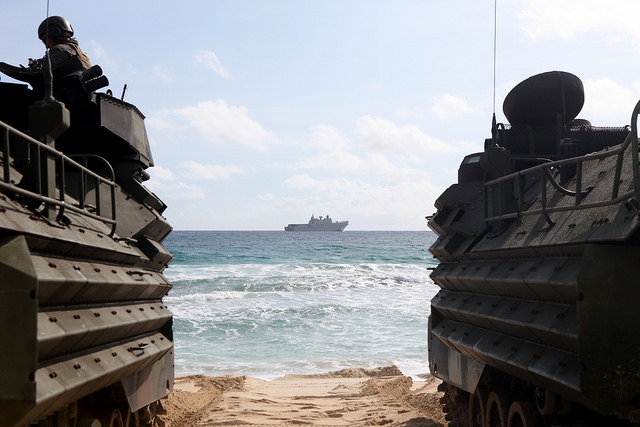
Australia’s international security outlook is starting to look very threatening. The White House is undermining the international order, has started a trade war with China and the EU, and is threatening the unity of NATO. At the same time, China and Russia are becoming increasingly assertive.
The former director-general of the Office of National Assessments Allan Gyngell has
stated that the international order we’ve known for the past 70 years has ended.
America’s belief in the system and willingness to invest in it with an effective network of alliances are now in doubt.
Beijing and Moscow are aligned in their contempt for a set of international rules and norms of behaviour that they see as having been invented by Washington. They are actively challenging the international security system.
Russia wants to see the end of NATO and a weak and divided Europe, a goal that has been aided by the attitude of US President Donald Trump. Trump
has said that he sees Russia as a competitor, not an enemy. That is not the view of European members of NATO. At the same time, he describes the EU as a
‘foe’ invented to take economic advantage of the US.
Trump’s meeting with Vladimir Putin in Helsinki last week was an utter disaster. In a stunning alignment with America’s major adversary, Trump described Putin as
‘extremely strong and powerful’ in his denial and accepted his advice—over that of his own intelligence community—that Russia hadn’t interfered with US elections. He
backed down after returning to Washington, saying he misspoke. Even so, the meeting with Putin effectively ended Russia’s international isolation.
Beijing is using coercion to bully the countries of Southeast Asia to accept a Chinese sphere of influence—a strategy it seems to be largely winning. China wants to be acknowledged as the natural hegemon of Asia and to see an end to America’s alliance system in the region, including ANZUS.
Importantly, we’re experiencing an increasingly unpredictable—some would say seriously unbalanced—President Trump. He boasts of having a trade war not only with China, but also with the EU and Canada. The world will stumble into a period of great uncertainty if a fully blown trade war results.
Trump has threatened the leaders of NATO countries with a US withdrawal from the alliance, saying that if they don’t spend more on defence
‘we are going to do our own thing’. That raises the question of whether a serious breach of trust in the transatlantic relationship is occurring.
We can take no joy in speculating that Trump might be gone in a little over two years. There are enduring grievances in America about the impact of globalisation and foreign trade on employment that support his popularity.
We are in a period of strategic transition in which the comfortable assumptions of the past are over. I’m not one of those who believe that America is about to pull out of Asia, but I do think we need to give serious thought to what Australia should do if the US made it clear that it expects us to do more for our own defence.
We need to take several actions to bolster our own security.
First, we need to focus more on our region of primary strategic concern, which includes Southeast Asia (including the South China Sea), the eastern Indian Ocean and the South Pacific. We should aim to reassert our influence in these areas as China moves increasingly to challenge our strategic space.
Second, we need to ensure that we continue to have access to highly advanced American military equipment, combat systems and weapons so that we maintain a technological edge in our own region. We have no credible defence future without the US alliance.
Third, we need to undertake a fundamental analysis of our relationship with China and determine where its limits should lie. We have become far too dependent on China for our economic wellbeing. We need to consciously diversify our trade, investment, tourism and international student businesses with other countries. They should include Japan, South Korea, India, Vietnam and Indonesia—as well as Europe, which is experiencing its own problems with China.
Fourth, the time has come for some serious long-term defence planning for Australia’s strategic future. It should include crisis situations in which the US may look to Australia to join it in military contingencies such as the South China Sea, Taiwan, the Korean peninsula, the Indian Ocean and the South Pacific. We must avoid being caught by surprise by such events.
Above all else, we must recognise that we now face the prospect—for the first time since World War II—of a potential major-power adversary, with whom we do not share fundamental values, operating in our neighbourhood and capable of threatening us with high-intensity conflict.
The key issues here are whether we’re now entering strategic warning time regarding future conflict, and whether our capabilities are sufficient to sustain a credible deterrence posture in a deteriorating strategic environment.
Events could now become much more serious, much more quickly. More thought should be given to planning for the expansion of the ADF and its capacity to engage in sustained high-intensity conflict in our own defence—in a way that we haven’t had to consider for several generations.
 Print This Post
Print This Post